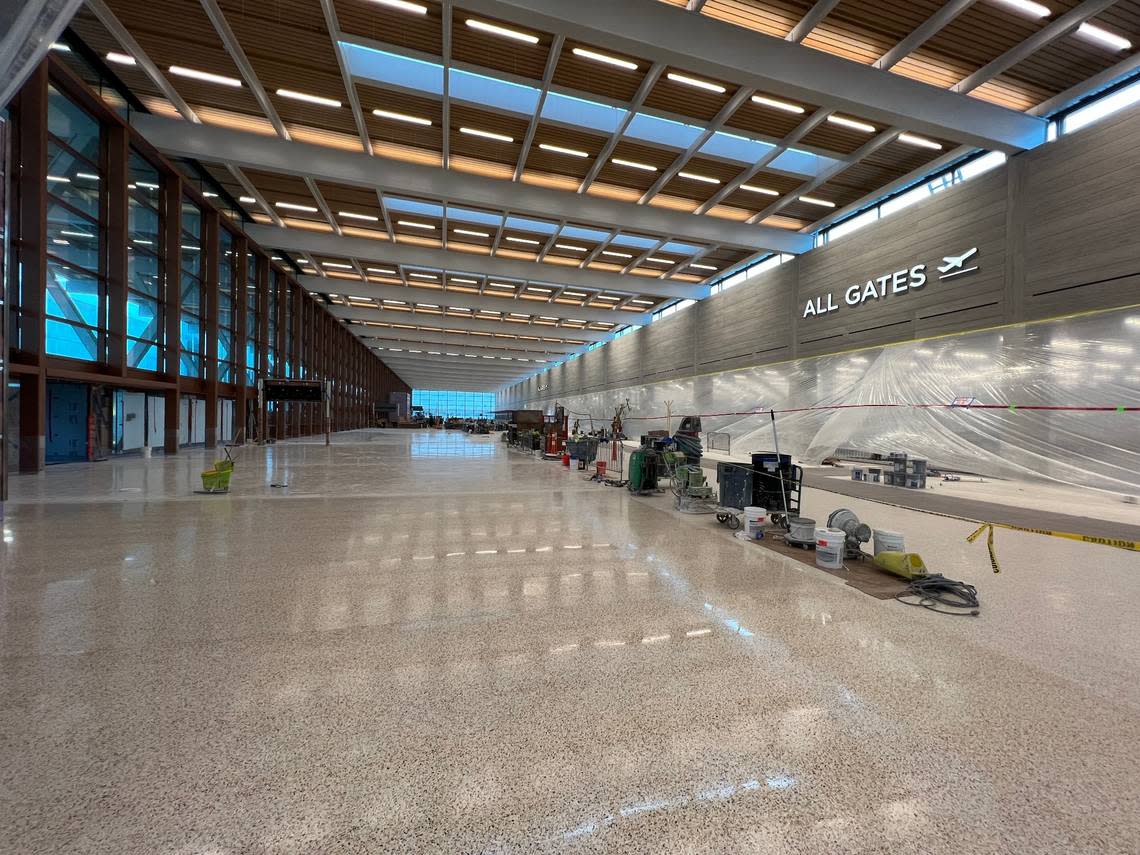Flying private: The secret $62 million legal fight over the Kansas City airport
The Kansas City engineering firm that lost out on its bid to build the city’s soon-to-open billion-dollar airport has been awarded $62 million over legal misconduct by an attorney representing the city, according to a document obtained by The Star.
In a private, binding arbitration dispute undisclosed until now, Burns & McDonnell claimed that the actions of Husch Blackwell attorney Charles Renner — whom the city hired as outside counsel to represent it during the airport selection process — caused the engineering firm to lose out to the eventual winner of the airport contract, Maryland-based Edgemoor Infrastructure and Real Estate.
The panel of arbitrators — judges, essentially — appointed to hear the case came to a unanimous ruling in favor of Burns & McDonnell. The $62 million Husch Blackwell has been ordered to pay is equivalent to the fee Burns & McDonnell would have received had it won the airport contract.
The 33-page decision obtained by The Star provides rare visibility into the mechanics and behind-the-scenes politicking involved in the quest to nab one of the most coveted municipal contracts in Kansas City history.
Its conclusions are damning. After Burns & McDonnell rebuffed his offer to represent the firm on the airport project, Renner got hired by the city through an ordinance put forth by then councilman and now-Mayor Quinton Lucas. His job was to provide the city with legal advice as it navigated the public-private complexities of the airport selection process. He used that insider position, the panel found, to undermine Burns & McDonnell’s bid and disqualify it from the competition.
Kansas City’s billion-dollar airport contract eventually went to Edgemoor — a company Renner had represented on a different public-private project the previous year.
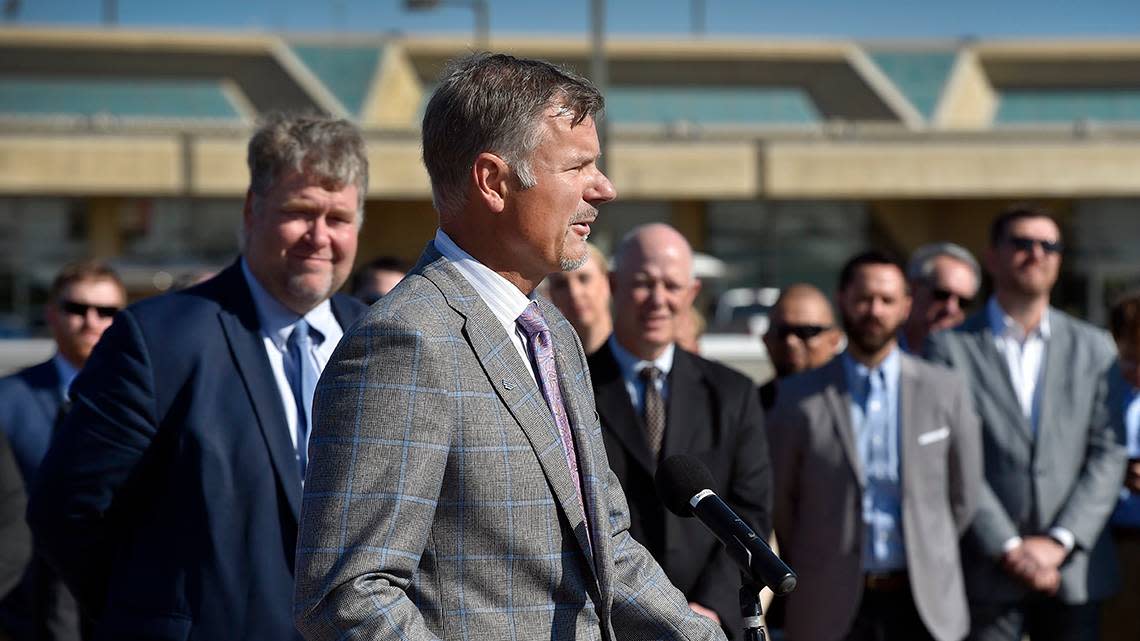
Entering into arbitration
The dispute between Burns & McDonnell and Husch Blackwell was not previously made public because it was argued in arbitration, a quasi-judicial process outside of a traditional court setting.
Binding arbitration clauses are common in business contracts. Claims are settled by an arbitrator or panel of arbitrators selected by the two parties — no judge, no jury. The parties agree to confidentiality, and the paperwork never makes it to the courthouse, where reporters and the public can access the information.
Husch Blackwell and Burns & McDonnell entered into an arbitration agreement in June 2020, according to the “Final Reasoned Award” that The Star obtained.
The three-arbitrator panel that heard the firms’ arguments was composed of Sandra C. Midkiff and Jay A. Daugherty, both of whom are former Jackson County Circuit Court judges, and Leland M. Shurin, a mediator whom President Bill Clinton nominated for a federal judgeship in 1995 but whose nomination was withdrawn because Democrats didn’t have the votes to confirm him.
Husch Blackwell and Burns & McDonnell both declined to comment to The Star, sending identical responses to questions about the $62 million award.
“Husch Blackwell and Burns & McDonnell have a dispute relating to the professional services provided by Husch Blackwell to Burns & McDonnell. Husch Blackwell and Burns & McDonnell agreed to submit their dispute to confidential and binding arbitration. Because of the confidential nature of the arbitration proceedings, the parties are unable to comment on this matter.”
Both firms are headquartered in Kansas City. Husch Blackwell is the third-largest law firm in the city, employing approximately 150 attorneys in the area. Burns & McDonnell is one of Kansas City’s largest private employers; roughly half of its 10,000 employees are based locally. It was the original engineer of record for the existing Kansas City International Airport, built in 1972, and oversaw improvement to the terminals in the early 2000s.
The two firms have a longtime relationship. Husch Blackwell partner Ken Slavens has represented Burns & McDonnell since 1981, and between 2007 and 2017 Husch Blackwell sought 11 conflict of interest waivers from Burns & McDonnell — evidence, the panel found, that even when Husch Blackwell was not actively performing legal work for Burns & McDonnell, it still considered itself to have an attorney-client relationship with the engineering firm.
It is the violation of this attorney-client relationship in regards to the airport selection process that is the subject of the dispute.
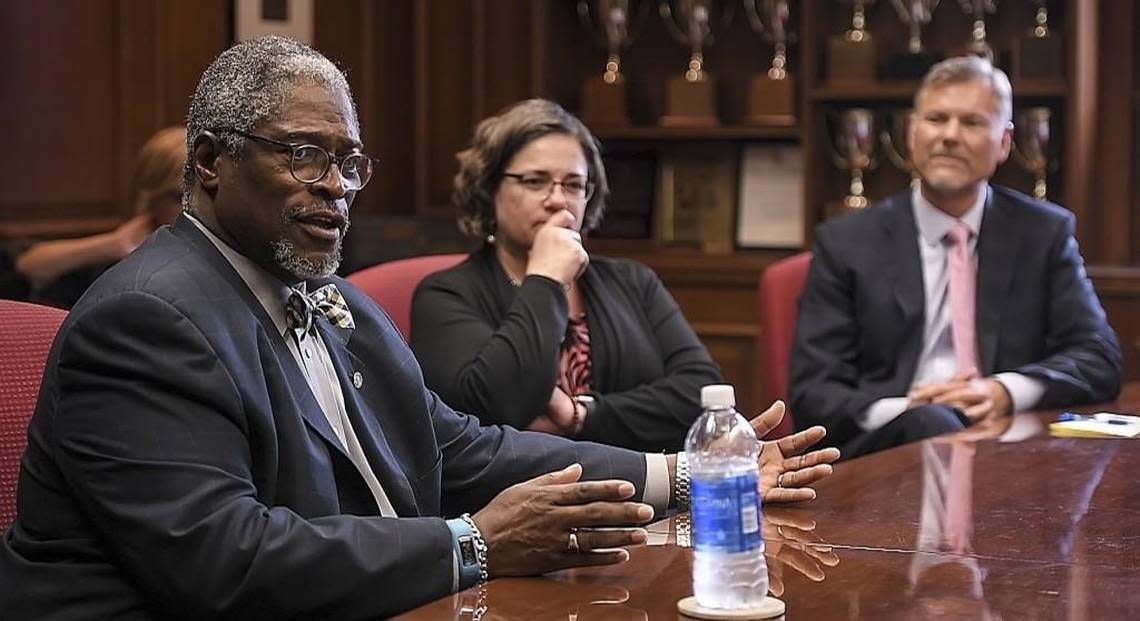
Behind closed doors
Civic conversations about replacing KCI stretch back to 2011 and began to pick up steam in 2014, when a study issued by the city’s Aviation Department and the airlines recommended the construction of a publicly financed single-terminal airport with a $964 million price tag.
Polls suggested the public wasn’t on board with that steep of a price, and then-Mayor Sly James announced in 2016 that the city wouldn’t move forward with the project. He issued a challenge to the business community to come up with a solution that didn’t involve public financing.
In March of the following year, Burns & McDonnell began meeting behind closed doors with Kansas City leaders — James, then-Councilwoman Jolie Justus and then-City Manager Troy Schulte among them — about a “sole-source” airport proposal. In essence, Burns & McDonnell would raise the money through private lenders in exchange for being awarded the exclusive contract.
When word of a possible deal began to leak, Renner, an attorney specializing in public-private partnerships, pitched his services to Burns & McDonnell. Would their firm be interested in retaining him and Husch Blackwell for the KCI project?
“Renner’s email solicitation was politely declined,” the panel writes.
The following day — May 11, 2017 — Renner began pitching council members on hiring him and Husch Blackwell as outside counsel for the city on the airport project. He also offered his opinion that Burns & McDonnell’s no-bid deal would be bad for the city and that it should be opened up for a competitive bid process.
Renner shared similar thoughts with the media, speaking off the record with reporters from The Star, KSHB and the Kansas City Business Journal, according to the panel’s findings. A Star editorial on May 11 broke the news of the backroom airport discussions. It also expressed concern about the lack of open competition and a rushed timetable that “would have given the public just one week to offer comment and perspective on the framework for one of the largest public works projects in city history.”
Burns & McDonnell leaders were surprised to see a Husch Blackwell attorney quoted in a May 12 KSHB story criticizing their proposal. Paul Odum, an in-house attorney with Burns & McDonnell, called Slavens to admonish him for Renner’s conduct. Slavens then called Renner seeking an explanation.
“I never spoke to that reporter other than to decline an interview,” Renner told Slavens, according to the email Slavens subsequently sent to Odum. “I have made no comment about the bidding process on this deal to the media at all.”
In fact, he had. Just a few days before, Renner had given a KSHB reporter permission to use a quote he’d previously given to the Business Journal, recommending that the airport project be opened up to more competition. “That quote is from a while back but it is an accurate quote,” Renner wrote in an email to the reporter.
Renner also failed to disclose to Slavens (and ultimately Burns & McDonnell) that he had been emailing information on public-private partnership “best practices” to a Star reporter. These off-the-record communications, which were tacitly skeptical of the Burns & McDonnell plan, had occurred just two hours before Renner’s call with Slavens.
“Renner intentionally misled Husch’s client about his activities,” the panel writes.
Nor did Renner mention that he’d spent the past few days expressing skepticism of Burns & McDonnell’s plan to council members, telling them that it was “uniquely lacking,” “bad for the city” and “has more of a ‘back of the napkin’ feel,” according to emails and texts that surfaced during the arbitration dispute.
Even after he was reprimanded by Slavens, Renner continued to lobby the city council. The same evening of their call, he emailed to council members Lee Barnes and Alissia Canady a detailed memo laying out “points to consider” regarding Burns & McDonnell’s proposal and advocating for himself as outside counsel. The next day, Renner and Husch Blackwell submitted a formal statement to the city soliciting work as outside counsel on the airport project.
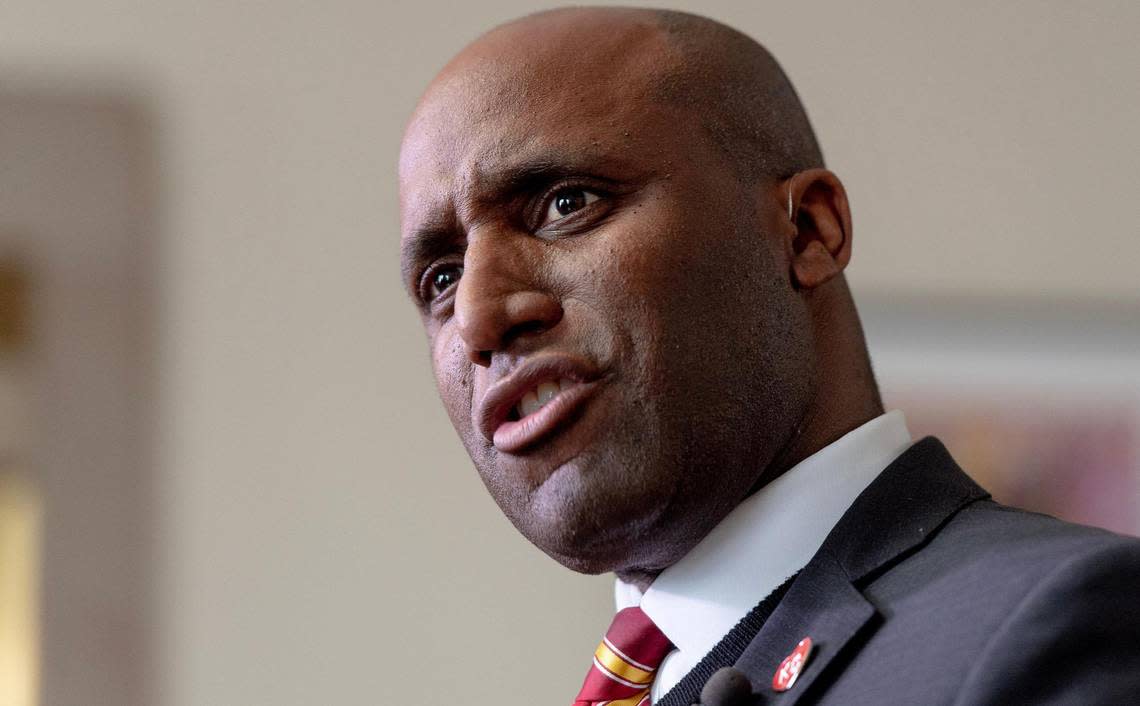
Two days later, then-Councilman Lucas proposed an ordinance to hire Husch Blackwell and the Washington, D.C., law firm Wilmer Hale for the job. The council voted in favor, allocating $475,000. Earlier that day, aware that the ordinance would come before the council that afternoon, Renner had attended an event at Burns & McDonnell’s headquarters. He didn’t mention to anyone that the city was planning a vote to retain him as counsel on the airport.
“There is no dispute that Renner knew that Burns & McDonnell was a client of the Husch law firm,” the panel concludes. “His failure to disclose comments he had made to members of the City Council is a violation of his duty of loyalty to the firm’s client.”
Lucas, who was deposed as part of the arbitration process, told The Star this week that he was “proud of the fact that we pushed to retain outside counsel and didn’t just go with (Burns & McDonnell’s original) sole source proposal.” He said that his preference for the role of outside counsel was Wilmer Hale but that in order to get the necessary seven votes from the council he felt it was necessary to also include a local firm — hence Renner and Husch Blackwell.
“(Renner) represented that he had good P3 (public-private partnership) experience and has — and frankly continues to have — strong relationships with the city council, so I think that’s why he was looked to favorably,” Lucas said. “I would note that in situations like that, none of us on the council are aware of potential conflicts, and we expect people like Renner or any other lawyer to disclose those conflicts to us.”
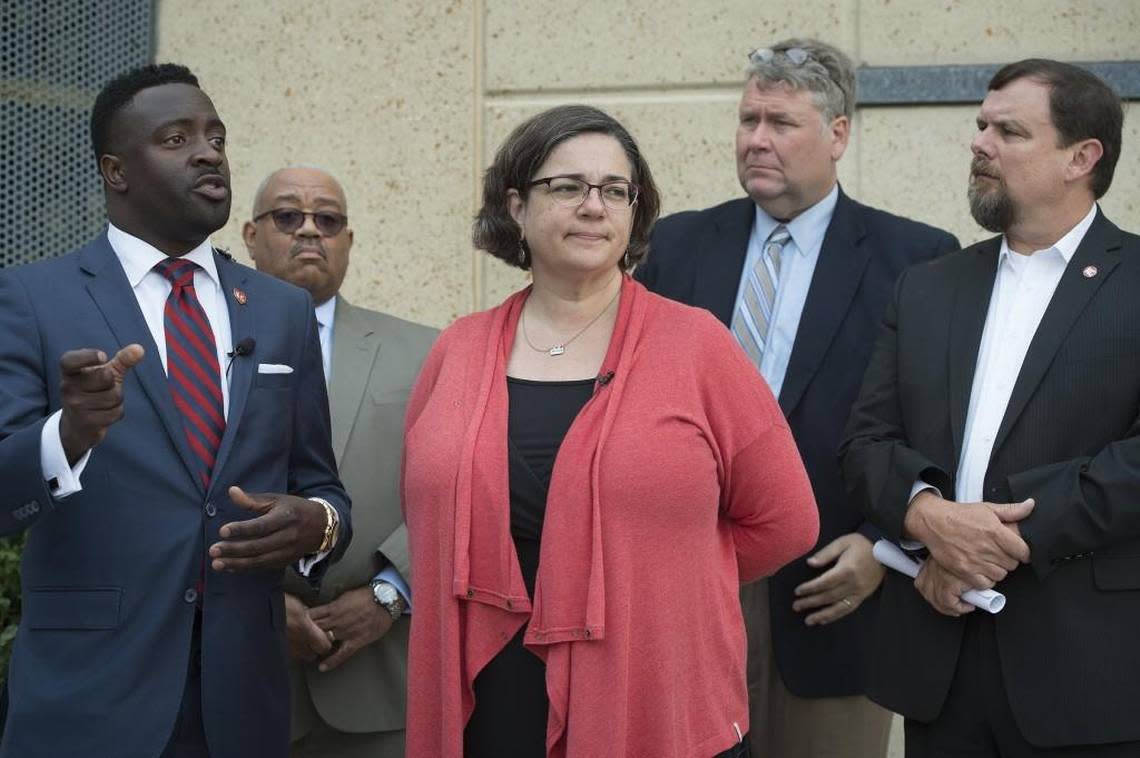
Enter Edgemoor
In 2016, Renner and Husch Blackwell had represented the Bethesda, Maryland-based Edgemoor and the local firm McCownGordon Construction on a public-private real estate development at the University of Kansas.
Because Edgemoor and McCownGordon were known to be interested in jointly pursuing the airport contract, Renner’s work for Edgemoor was disclosed and debated when he was lobbying to become the city’s outside counsel. But he and Husch Blackwell maintained that their legal connections to Edgemoor ended by May 2016, and the city decided that his history with the company did not amount to a conflict of interest.
But that is not what the arbitration panel found. Renner and Husch, the panel wrote, “failed to disclose their continued contacts and communications … with executives of Edgemoor and McCownGordon regarding the KCI airport terminal project. Ongoing meetings, dinners, emails and phone conferences occurred throughout all of 2016 and into 2017.”
For example, Renner joined representatives of Edgemoor and McCownGordon for a July 2016 meeting with Councilwoman Justus and Aviation Department Director Pat Klein at the city’s Aviation Department. “It was good getting together with you and the group to discuss the KCI question,” Renner wrote in an email to Edgemoor and McCownGordon representatives. “I did have a couple of thoughts about some procedural matters that may be helpful going forward.”
In August 2016, Renner referred to Edgemoor as “Husch’s client” when trying to secure a suite at a Kansas City Royals game for Edgemoor representatives. Husch representatives eventually admitted to the arbitration panel that “(Edgemoor) was a client of Husch from August 9, 2016 to November 23, 2016, and again on January 4, 2017.”
On May 30, 2017 — two weeks after the city hired Renner and Husch Blackwell — City Manager Troy Schulte announced that the city would not move forward with Burns & McDonnell’s sole-source proposal and instead open the project up to other bids. Edgemoor and another bidder, AECOM, entered the fray.
Burns & McDonnell would still have an edge on competing bidders, though, via the inclusion of a “Swiss Challenge” that allowed the firm to match or better any other proposals.
Schulte told the arbitration panel that, because Burns & McDonnell had “laid their cards on the table early,” he wanted to make sure they “got a fair shot at the final end product.”
Soon, though, that advantage was stripped away from Burns & McDonnell — the result of “dozens of hours” Renner and Husch lawyers spent analyzing and researching the subject, Schulte told the arbitration panel:
Q: Can we agree that Charles Renner and his law firm played a role in your decision to drop the Swiss Challenge?
A: Yes.
Renner also advised the city council that a longer solicitation process for bids would be “more fair” to companies interested in submitting an airport proposal. So on June 8, the deadline for submissions was extended.
“Good news,” Edgemoor managing director Geoffrey Stricker wrote in an email to Renner.
And in August 2017 — while Renner was serving as counsel for the city — Husch lawyers drafted a term sheet and memorandum of understanding for Edgemoor to design and build the new airport, unbeknownst to Burns & McDonnell.
“While Husch was preparing these documents and billing the city for the legal work, Renner still maintained favoritism and a legal confidential relationship with Edgemoor, all in direct competition with, and adverse to the interest of, Burns & McDonnell in the competitive bid process,” the panel wrote. “This conflict continued and went undisclosed by Renner and Husch. Burns & McDonnell was unaware of the material facts relating to this conflict of interest. The acts described above amount to a separate and ongoing conflict, and breach of Renner and Husch’s duty of loyalty to Burns & McDonnell.”
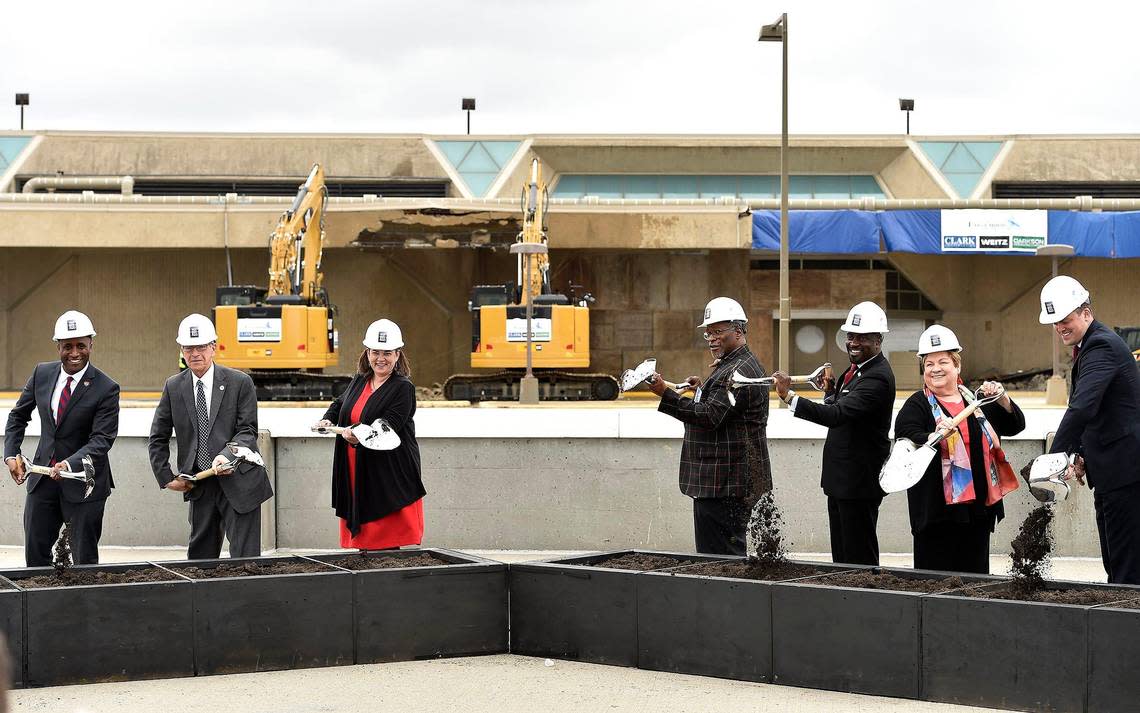
We have a winner
Burns & McDonnell’s concerns about Renner’s Edgemoor connections surfaced on Sept. 5, 2017 — one day before the city’s airport selection committee was due to announce its recommendation.
David Frantze, a lawyer representing Burns & McDonnell on the KCI project, sent a letter to City Hall laying out Renner’s conflict of interest. Burns & McDonnell weighed in separately in a statement to The Star at the time, urging the city to remove Renner’s team from the selection process and disregard any work or advice the city had received from them.
“We are still learning details about Mr. Charles Renner’s relationship with one of the proposing firms,” Burns & McDonnell said in a statement to The Star that evening. “The non-disclosure of this relationship certainly gives the appearance of impropriety.”
The letter was ultimately in vain. The following day, the selection committee — which included council members Justus and Jermaine Reed; Schulte; and three Aviation Department officials — announced its choice: Edgemoor.
Burns & McDonnell had been disqualified, according to a selection committee memo drafted by Husch Blackwell, because its financing proposal was not in compliance with the city’s master bond ordinance, which sets terms for how airport revenues are distributed and debt is issued.
It was a shock to some.
“I’ll be 100% honest: I was in that room when they had the big reveal of the winner, and everybody was like, ‘Who?’” Lucas told The Star this week. “We all thought it was AECOM versus Burns & McDonnell. I think a lot of us were surprised Edgemoor was the recommended choice.”
Lucas also testified to the panel that he felt the issue of the master bond ordinance should have been decided by the city council, as opposed to the selection committee or other city staff.
James testified to the panel that he was “stunned by the disqualification of Burns & McDonnell based on the MBO issue.”
Schulte testified that Burns & McDonnell was his first choice and, he believed, the first choice of the majority of the members of the selection committee, but that Burns & McDonnell was disqualified on the advice of Husch and Renner.
“The impropriety, in my mind, has always … had more to do with finding ways to get Burns & Mac out of the process,” Schulte told the arbitration panel.
When the matter came to a vote before the council, two weeks after the selection committee’s recommendation, it was not inevitable that Edgemoor would win the contract. Some members on the council — Teresa Loar and Lucas are cited in the arbitration document — said they preferred Burns & McDonnell’s proposal. But Renner told them that voting for Burns & McDonnell was not possible.
“We were told in a way that I think lacked candor that it was not an option,” Lucas testified to the arbitration panel.
In the end, the council voted 10-2 to award the contract to Edgemoor, with council members Barnes and Scott Taylor casting the no votes.
In December 2017, Renner — who had previously expressed concern over the “great risks” and “large gaps” that Burns & McDonnell’s original proposal posed to the city — submitted the memorandum of understanding (MOU) he’d spent three months negotiating with Edgemoor.
A majority of the council balked.
“The way it’s currently written, there’s no shared risk between the city and Edgemoor,” Councilman Kevin McManus said at the time. “The MOU shifts all the risk away from Edgemoor. They (Edgemoor) can back out for any reason and walk away from the project, and the city would be on the hook to reimburse them amounts that are uncapped in this MOU.”
Lucas noted in a Facebook post at the time that Renner’s MOU “obligates millions in payments to the developer for some questionable costs,” including $20,000 a month for “consultants” and $45,000 a month for travel.
The council rejected Renner’s MOU and subsequently negotiated one that put Edgemoor on a tighter leash.
One more cruel irony awaited the losing team at Burns & McDonnell: The master bond ordinance that had eliminated the firm from contention was later amended after it was determined that Edgemoor’s proposal wasn’t in compliance with it, either.
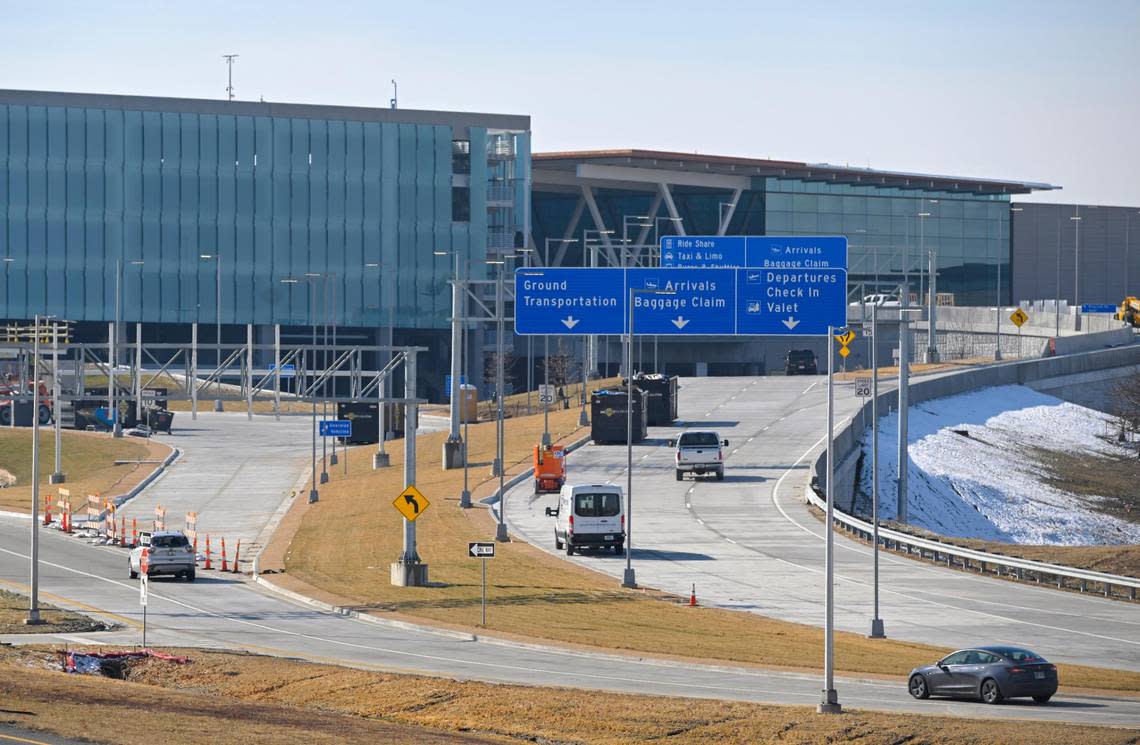
Sky-high costs
The arbitration panel ruled on the dispute between Burns & McDonnell and Husch Blackwell on Oct. 24, 2022.
Citing Husch and Renner’s “failures to disclose conflicts of interest and failures to act with undiluted and undivided loyalty to their client,” arbitrators Midkiff, Daugherty and Shurin unanimously awarded Burns & McDonnell $62 million — an amount that reflected “the loss of all profits” the firm stood to make had it won the bid.
“Burns & McDonnell was denied the award of a contract with the city for the design and build of the Kansas City Airport Terminal by the actions, nondisclosures and influence of Husch and Renner,” the panel concluded.
Because Husch would not comment on the matter, it is not clear whether the law firm took a $62 million hit or if it carried an insurance policy that paid it out. Last week, Husch Blackwell announced that it would be opening a Minneapolis office and that it has “aggressively expanded its attorney ranks during the first two weeks of 2023, adding 13 new attorneys — four at the partner level.”
According to his social media pages and the Husch Blackwell website, Renner remains employed there. The Missouri Office of Chief Disciplinary Counsel has no record of any actions taken against Renner, though that doesn’t necessarily mean no complaints have been filed. Complaints are not made public until they reach that office’s disciplinary panel.
Lucas, now the mayor of Kansas City, would not say whether the findings of the arbitration panel would influence Renner’s future work prospects with the city.
“I have retained a positive working relationship with Burns & McDonnell and Husch and all the individuals associated here,” he said. “I’ll look at issues as they come up on a case-by-base basis.”
Lucas also declined to comment on Renner’s rumored involvement in Kansas City’s latest public-private project: the proposed $2 billion downtown ballpark for the Kansas City Royals. (Adam Sachs, a former Husch Blackwell senior partner, left the firm to become the Royals’ chief legal officer in 2021.)
“I’ll leave that to the Royals to represent that,” Lucas said. “They have a number of folks engaged.”
Has the mayor ever participated in any city discussions about the downtown ballpark with Renner? “I’ll leave it at that,” Lucas repeated.
In a team statement Tuesday, the Royals said: “We utilize numerous law firms as part of our normal business and special projects, including Husch Blackwell. As a practice, we don’t comment on any of these professional engagements.”
